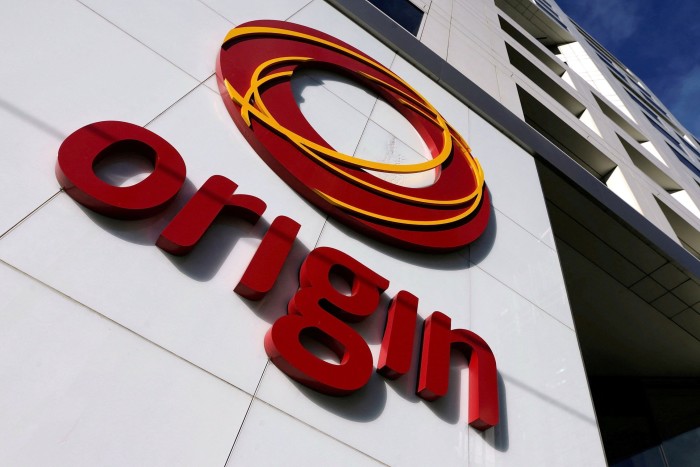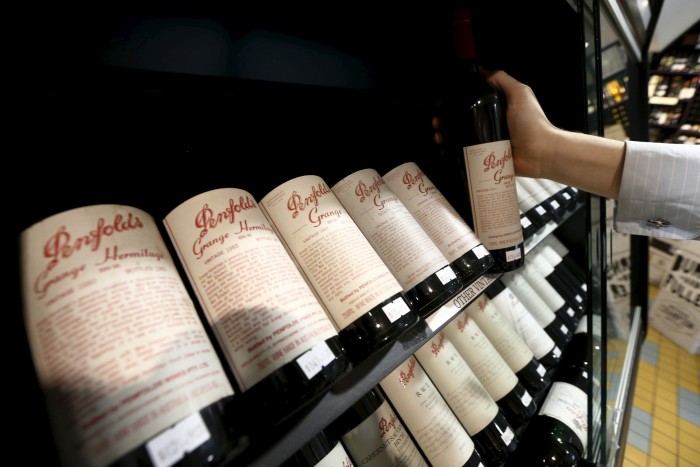Italian economy stagnates in third quarter as domestic demand falls
Italy’s economy stagnated in the three months to September, rebounding from the previous quarter but still undershooting economists’ expectations, as falling domestic demand offset a boost from international trade.
The Italian statistics agency said there was growth in industry but lower output from farming, adding: “From the demand side, there is a negative contribution by the domestic component (gross of change in inventories) and a positive one by the net export component.”
The country’s zero growth in the third quarter marks a rebound from the previous quarter when gross domestic product fell 0.4 per cent. Economists had forecast third-quarter growth of 0.1 per cent in a Reuters poll.
Risers and fallers in Europe
Big share price moves in Europe today include UK oil giant BP, French transport company Thales and British aerospace company Rolls-Royce:
-
BP: Shares in the FTSE 100 resources company slipped 4.9 per cent after it reported a steep drop in profits in the third quarter.

-
Thales: Shares in the French transport and aerospace company fell 4.2 per cent in early trade after its third-quarter order intake came in at €3.8bn, below analyst expectations of €4.5bn.
-
Rolls-Royce: The British aerospace company’s shares rose 4 per cent after analysts at Barclays raised their target price to 270p from 239p.
Falling energy prices push Dutch inflation further into negative territory
Dutch inflation has fallen further into negative territory, after consumer prices declined 1 per cent in the year to October due to tumbling energy prices.
The fall in Dutch consumer prices was caused by a 40 per cent year-on-year drop in energy prices, including motor fuels. Core inflation, excluding energy and food prices, fell from 5.5 per cent in September to 5.1 per cent in October.
It is not the first time Dutch inflation has been negative — it was minus 0.3 per cent in September.
Hong Kong economy grows less than expected in third quarter
Hong Kong’s economy grew less than expected in the third quarter, as the Asian financial hub’s efforts to boost growth lose steam amid China’s slowdown and US interest rate hikes.
The Chinese territory on Tuesday reported year-on-year growth in gross domestic product for the period of 4.1 per cent — slower than the 5.2 per cent growth projected by a Reuters poll of economists — in part due to a sluggish 1.5 per cent rise in the second quarter compared with the previous year.
Officials earlier revised down the territory’s annual growth forecast to between 4 and 5 per cent, from a previous prediction of 3.5 to 5.5 per cent.
European stocks inch higher ahead of inflation data
European stocks inched higher in morning trade on Tuesday, shortly before the release of the eurozone’s latest inflation and gross domestic product figures.
The region-wide Stoxx Europe 600 rose 0.2 per cent, France’s Cac 40 added 0.3 per cent and London’s FTSE 100 gained 0.1 per cent.
Figures out later this morning are expected to show the eurozone’s harmonised index of prices dropped from 4.3 per cent in September to 3.1 per cent in October. That would mark the slowest annual price growth in the region for more than two years.
Year on year GDP for the bloc is forecast to have slowed to 0.2 per cent in the third quarter from 0.5 per cent in the second.
BHP approves $5bn investment in fertiliser mine
BHP has approved a $5bn investment to expand a vast fertiliser mine in Canada, as the world’s largest mining company bets on future growth in the farming market.
Construction of the second stage of the Jansen mine in Saskatchewan will cost $4.9bn, taking total investment in the project to $15bn and doubling future production to 8.5mn tonnes a year of potash, a mineral rich in potassium, which is one of the three essential nutrients for crop growth.
Jansen, which will be one of the world’s largest fertiliser mines, is set to enter into first production near the end of 2026, diversifying BHP beyond copper, iron ore, nickel and steelmaking coal.
Spanish government considers Telefónica stake as Saudi group builds shareholding

The Spanish government is considering taking a stake in Telefónica in response to a move by Saudi telecoms group STC to acquire 9.9 per cent of the company.
After weeks of controversy over STC’s September move, the Spanish government holding company Sepi said it was monitoring the situation and “carrying out an internal exploratory analysis of a possible acquisition of a shareholding in Telefónica”.
STC has already acquired a 4.9 per cent stake in the company but needs government approval to increase that to 9.9 per cent by converting derivatives it has purchased into equity.
Some in government are uneasy about STC having a stake in a company involved in national security and cyber defence, said one senior official.
IG Group to cut 10% of workforce as trading volumes fall

Online trading company IG Group announced on Tuesday it would cut 10 per cent of its global staff, some 300 people, in an attempt to achieve annual cost savings of £50mn.
After a pandemic-fuelled boom, FTSE 250-listed IG Group, which offers both investing and spread betting services, has grappled with lower trading volumes and cash-strapped consumers with less to use on the platform.
“We want to position IG Group as a lean fintech company and today’s decisive actions ensure a strong platform for future growth,” said Charlie Rozes, the group’s acting chief executive.
Turkey halves trade deficit to $5bn as imports fall
Turkey’s trade deficit narrowed in September to the lowest level in two years in an early indication of how the government’s attempt to reduce imports is bearing fruit.
The trade gap nearly halved in September from the previous year to $5bn, bringing it to the lowest level since October 2021, according to the Turkish Statistical Institute. The decline was led by a 15 per cent year on year fall in imports, with exports inching lower by 0.5 per cent.
Turkey’s new economic management team has said that one of its top priorities is cooling red-hot consumer demand that had been elevating imports. The data released on Tuesday highlight how the new measures including interest rate and tax rises are beginning to take effect.
BP profits miss forecasts as earnings more than halve

BP reported underlying profits for the third quarter of $3.3bn as earnings more than halved from the same period last year.
The results, which missed market expectations of $4bn, are the first since chief executive Bernard Looney resigned in September over his failure to disclose past relationships with colleagues.
Interim chief executive Murray Auchincloss said oil and gas production was 3 per cent higher than last year and production costs 6 per cent lower.
But that strong performance could not compensate for lower prices for BP’s hydrocarbons and lower than expected results from its gas trading operations.
Despite the sharp drop in earnings BP continued with its share buyback programme, announcing plans to repurchase a further $1.5bn of shares.
BASF profits weighed down by manufacturing slowdown
BASF has said full-year sales and profits will come in at lower end of its forecast range, as the world’s biggest chemical group continues to suffer from falling demand for its products.
The German group said on Tuesday that third-quarter sales reached €15.7bn, down €6.2bn compared with the prior-year period, as prices slumped amid falling manufacturing output in Europe and China, and lower sales of consumer goods.
It now expects full-year sales to reach the lower end of the previously guided range of €73bn to €76bn, while earnings before interest and taxes would be at the low end of €4bn to €4.4bn.
“There are risks from a further decline in volumes and a stronger price reduction than expected,” said chief executive Martin Brudermüller.
Vodafone to sell Spanish business to UK fund for up to €5bn

Vodafone has announced the sale of its Spanish business to Zegona Communications for up to €5bn, as the telecoms group aims to improve its competitiveness and growth prospects.
The deal is made up of €4.1bn in cash and up to €0.9bn in the form of redeemable preference shares.
The UK telecoms investment fund had said the companies were in talks in September.
Margherita Della Valle, chief executive of Vodafone, said: “Following the recently announced transaction in the UK, Spain is the second of our larger markets in Europe where we are taking action to improve the Group’s competitiveness and growth prospects.”
Vodafone announced plans to merge its domestic business with CK Hutchison-owned Three UK in June.
Stellantis revenues rise despite €3bn hit from US strikes

US car worker strikes cost Stellantis €3bn in lost revenues, the Chrysler maker said on Tuesday, as it reported higher sales for the third quarter.
Stellantis finance chief Natalie Knight said the six weeks of strikes over pay had also hit the group’s profitability by nearly €750mn, a smaller impact than seen at some US rivals, due to strong business in its other regions and as the company trimmed costs. The company has reached a tentative deal with the United Auto Workers and Unifor unions.
Stellantis, which produces European brands such as Peugeot and Fiat and is also home to Jeep in the US, said revenues rose 7 per cent to €45.1bn in the third quarter, beating analyst expectations in a Reuters poll.
French economy slows sharply in third quarter

The French economy slowed sharply in the three months to September compared with the previous quarter, as a drop in exports and a drag from inventories offset a rebound in household spending.
The 0.1 per cent of quarter-on-quarter growth was in line with forecasts by economists polled by Reuters but showed a marked downturn from the 0.5 per cent growth in the previous quarter.
The French statistics agency said business investment rose 1 per cent while household spending rose 0.7 per cent. Government spending was up 0.4 per cent.
But trade made a negative contribution as exports fell 1.4 per cent and imports were down 0.5 per cent. Changes to inventories knocked 0.3 per cent off gross domestic product.
Chinese stocks dip as data dashes hopes of manufacturing rebound
Chinese stocks declined on Tuesday, as official data dashed hopes for a nascent recovery in the country’s manufacturing sector.
China’s CSI 300 fell 0.6 per cent, while Hong Kong’s Hang Seng index declined 1.8 per cent. The Hang Seng China Enterprises index fell 1.4 per cent, led by real estate, consumer goods and industrial stocks.
China’s official manufacturing purchasing managers index came in at 49.5 for October, below the 50-point mark that separates contraction from expansion. Some economists had hoped that last month’s reading of 50.2 had signalled the start of a gradual rebound.
South Korea’s Kospi fell 1.4 per cent. Japan’s Topix added 1 per cent and the yen rose after the Bank of Japan eased its yield curve controls.
What to watch in Europe today

UK events: The cap limiting bankers’ bonuses to twice their base salary is lifted, enacting a policy of the government of former prime minister Liz Truss. Simon Thompson, Royal Mail chief executive, steps down. Bank of England executive director for payments Victoria Cleland gives a keynote speech at the Digital Innovation Summit in London.
European events: Nato secretary general Jens Stoltenberg attends the annual Nordic Council meeting. Norway’s prime minister Jonas Gahr Støre and Swedish counterpart Ulf Kristersson hold a bilateral meeting. European Commission president Ursula von der Leyen visits Serbia and Montenegro.
Economic indicators: Third-quarter economic growth and consumer price index data for EU countries is published. France issues third-quarter gross domestic product, CPI and consumer spending data. Germany and Switzerland announce retail sales figures.
Corporate results: German chemicals multinational BASF, Bilbao-based lender BBVA, global oil giant BP, Nordic carrier Finnair and Amsterdam-listed carmaking group Stellantis are among companies that release third-quarter earnings.
Bank of Japan allows 10-year bond yields to rise above 1% cap
The Bank of Japan decided on Tuesday to allow yields on the 10-year Japanese government bond to rise above 1 per cent, revising its yield curve controls for the second time in three months.
In a statement, the BoJ said the 1 per cent control cap on 10-year JGB yields would be regarded as “a reference”, noting that strictly capping long-term interest rates could entail “large side effects”.
The BoJ kept its policy rate at minus 0.1 per cent but increased its inflation forecast, saying it expects 2.8 per cent core inflation in the 2024 fiscal year, instead of its previous forecast of 1.9 per cent.
Asian stocks decline on weak China manufacturing data
Chinese stocks led Asian equities lower on Tuesday as disappointing economic data dented market optimism.
Hong Kong’s Hang Seng index fell 1.6 per cent, China’s CSI 300 dropped 0.7 per cent and South Korea’s Kospi shed 1.2 per cent.
China’s manufacturing sector slipped back into contraction territory in October, data showed on Tuesday, while its non-manufacturing sector also performed worse than expected.
Japan’s Topix added 0.2 per cent after a local media report that the country’s central bank was considering relaxing its yield curve control policy later in the day weakened the yen and sent bond yields higher.
China’s manufacturing contracts in October, adding to momentum worries

China’s manufacturing activity contracted in October, an official gauge showed, adding to concerns over growth momentum in the world’s second-largest economy.
The country’s official manufacturing purchasing managers’ index was 49.5 this month, compared with 50.2 in September. A reading of 50 or over marks expansion against the previous month.
China’s economy has this year grappled with a disappointing rebound from the ending of Covid-19 policies, as well as a slowdown across its economically-critical real estate sector.
Tuesday’s data reverses a shift into expansion in September, which had followed five consecutive months of contraction.
Samsung forecasts AI-driven rebound in memory chip market
Samsung Electronics expects the memory market to rebound next year, forecasting on Tuesday that artificial intelligence applications will drive chip demand despite a slowdown in the global economy.
“In 2024, while macroeconomic uncertainties are likely to persist, memory market conditions are expected to recover,” the world’s largest memory chipmaker said.
The upbeat outlook comes after the South Korean company reported third-quarter net profits of Won5.8tn ($4.3bn), a 38 per cent drop from a year earlier but much higher than the Won2.5tn forecast by analysts polled by Bloomberg.
The company’s operating loss from the semiconductor business narrowed to Won3.8tn in the July-September quarter. That compared to a Won4.4tn loss in the previous three month period.
Australian pension fund opposes Origin takeover by Brookfield-led group

Australia’s largest pension fund has said it will vote against the Brookfield-led takeover of energy company Origin after it said an offer of $11.9bn substantially undervalues the business.
AustralianSuper owns a 13.7 per cent stake in Origin, having increased its holding in recent weeks. The fund has joined several other shareholders in arguing that the offer for Origin made last November is too low.
The value of Origin’s stake in UK business Octopus has partly fuelled the demand for a higher offer.
Toronto-based Brookfield teamed up with US investor EIG to take Origin private and break up the business. It requires 75 per cent of shareholders to approve the offer.
Japanese government bond yields push near 1% after report on possible BoJ relaxation
The yield on the 10-year Japanese government bond rose close to 1 per cent on Tuesday, its highest level in more than a decade, as investors bet the Bank of Japan would further relax its controls on the bond market later in the day.
The 10-year JGB yield hit 0.957 per cent, the highest since June 2013, while the yen was down 0.4 per cent at 149.45 against the US dollar.
The market moves came after the Nikkei, the Japanese newspaper, reported that the BoJ was considering allowing the 10-year JGB yield to rise above its current cap of 1 per cent.
Californian label Daou sold to Australia’s Treasury Wine Estates for $900mn

Treasury Wine Estates, the Australian producer behind Penfolds, has agreed to pay $900mn for Californian luxury brand Daou Vineyards.
TWE has been investing in the US as part of a restructuring of its assets since China — previously the largest market for Australian wine — imposed punitive tariffs in 2020.
A further earn-out of $100mn has been included as part of the deal to acquire what TWE said was the fastest growing luxury wine brand in the US over the past year.
Shares in TWE were halted on Tuesday as part of a fundraising to finance the deal.
What to watch in Asia today
Events: Many Asia-Pacific cities celebrate Halloween, but Seoul will be cautiously marking a year since a surge of revellers resulted in 151 deaths and more than 80 injuries. Tokyo’s busy Shibuya district has imposed a policy of no alcohol in the streets, amid fears of a similar crush. Anime Tokyo Station opens in the Japanese capital’s Ikebukuro district. The Association of Japanese Animations and the Tokyo metropolitan government earlier this year signed an agreement to open a landmark facility devoted to the Japanese visual art.
Central banks: The Bank of Japan will conclude its two-day policy meeting and release fresh quarterly growth and inflation forecasts, while the Reserve Bank of New Zealand issues an activity report.
Economic indicators: Japan announces unemployment figures for September. China issues official manufacturing purchasing managers’ index data for October. South Korea releases industrial production and retail sales for September. The ANZ New Zealand business confidence index for October is available.
Corporate results: Foxconn Industrial Internet and Yum China are among companies reporting third-quarter data. Indian telco Bharti Airtel and Japan’s Daiichi Sankyo, Denso, Japan Tobacco, Mitsubishi Electric and Mitsui & Co announce second-quarter earnings.
SolarWinds sued by SEC after 2020 breach by Russian hackers

SolarWinds, the IT company breached by Russian hackers as part of a sprawling espionage campaign in 2020, has been sued by the US Securities and Exchange Commission.
The SEC on Monday filed a complaint accusing the company and chief information security officer Timothy Brown of misleading investors by not disclosing “known risks” and not accurately representing its cyber security measures.
“We allege that, for years, SolarWinds and Brown ignored repeated red flags about SolarWinds’ cyber risks, which were well known throughout the company and led one of Brown’s subordinates to conclude: ‘We’re so far from being a security minded company’,” Gurbir Grewal, director of the SEC’s enforcement division, said in a statement.
S&P upgrades Ford as cost cuts expected to offset new labour contract
S&P has upgraded Ford to investment-grade territory, citing the carmaker’s improving margins and expectations that its cost reduction programme would “more than offset higher labour-related costs”.
In a Monday update, the rating agency moved Ford up to triple-B minus from double-B plus.
Ford reached a tentative agreement last week with the United Auto Workers union that would increase member wages by 25 per cent over four years, following a historic 40-day strike against the traditional Big Three domestic car manufacturers.
S&P’s move comes after Fitch raised the company to investment grade status in September.
Moody’s lifted the company to the highest notch of junk territory in July.
Bank of Canada rate-setting group ‘has not started’ discussing when to cut

A top Bank of Canada official has said that the central bank’s monetary policy setting body has not yet discussed when to start cutting interest rates.
Once the bank is confident that inflation is coming down and remains at those levels, “we would start thinking about lowering interest rates, but we’re just not there yet,” senior deputy governor Carolyn Rogers told the country’s House of Commons on Monday.
The BoC’s “governing council has not started talking about when we’ll reduce interest rates”, she said.
The bank held its key interest rate at 5 per cent last week because officials want to give monetary policy time to cool the economy and relieve price pressures, BoC governor Tiff Macklem told lawmakers.
S&P 500 notches biggest gain in two months as Fed meeting looms
Wall Street stocks closed higher and oil prices dropped at the start of a week of closely watched economic data, with the upcoming Federal Reserve rate decision front and centre.
The benchmark S&P 500 closed 1.2 per cent higher for the gauge’s biggest one-day gain since late August. The tech-heavy Nasdaq Composite also gained 1.2 per cent.
In government debt markets, Treasury yields also edged up — signalling a drop in prices. Brent crude oil fell roughly 3 per cent to remain below $90 a barrel.
Markets are currently pricing in the likelihood that the Fed will keep rates unchanged in a range of 5.25-5.5 per cent when it announces its policy decision on Wednesday.

Barbara Terrio is a seasoned business journalist, delving into the world of finance, startups, and entrepreneurship. With a knack for demystifying complex economic trends, she helps readers navigate the business landscape. Outside of her reporting, Barbara is an advocate for financial literacy and enjoys mentoring aspiring entrepreneurs.







